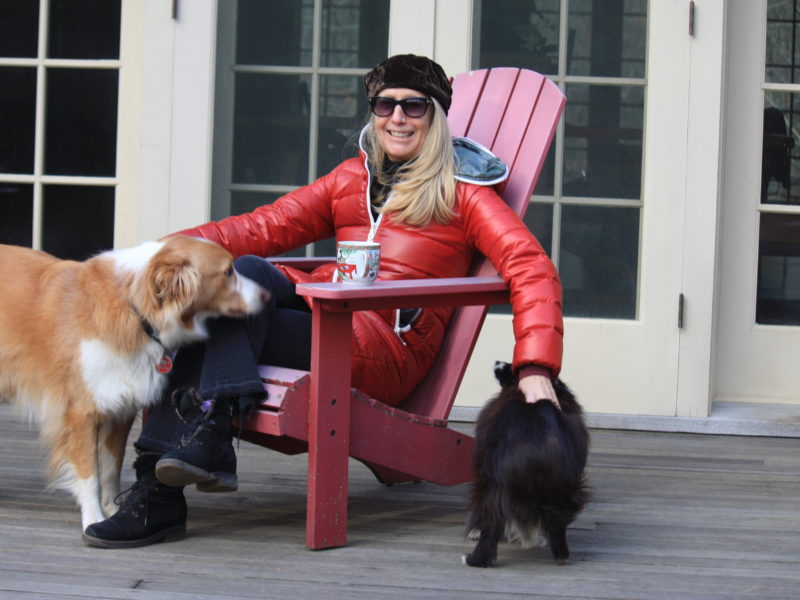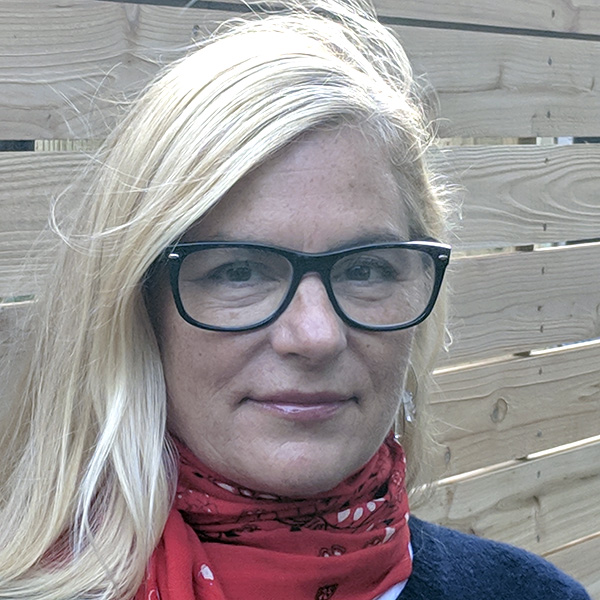

Folk rock artist Taylor Barton’s catalog contains over 500 songs, including a dozen albums, from her first, “Mean American Dream” with her then band Generic Blondes, to “Spiritual Gangster” and “House of Light.”
“I Pitched a Tent in Hell,” a nine-part musical memoir, is her latest project, released as an Audible audiobook. A paperback is also available as an adjunct.
“Audible is really the way to experience it,” said Barton, sitting on a pink Adirondack chair outside her Amagansett home in the woods of Stony Hill.
“It’s a music memoir of my life as a songwriter: the good, bad, funny or indifferent, with a touch of mischief and sarcasm,” she added, explaining that folk has been intertwined with jazz, blues and even Indian music.
Barton grew up in Baltimore, Maryland, in a family that prized homily, habit and humor above all else. Truth was not at the top of her family’s values. The things that went unsaid left the sensitive child feeling fearful and insecure.
She turned her anger inward, which culminated in lifelong depression. Still, Barton says she was never the type to lay in bed all day. “I’m the most functioning depressive I know,” she said. “I’ve always been a get-up-and-go person.”
At 13, she ran away from home and traveled seven hours by train to Boston.
“If my daughter did that I’d be out of my mind,” she said.
After sleeping in a car for two weeks and some pretty sketchy nights in Boston Commons, she went home. “My parents said nothing.”
She became a champion tennis player, rode horses and danced. By the age of 23, she was hitting the boards on Broadway as a jazz dancer.
Her first dance teacher turned her onto meditation which she still practices daily. “It helps,” she said. “If you’re listening you get all these incredible cues.”
Her father owned a successful advertising and public relations firm and constantly cheated on her mother, who was bipolar. Her father’s infidelity took a toll on the family, and when she was 27, her parents divorced.
“The weirdness never goes away,” she said of her fractured family. Her parents did nothing to keep the family together post-divorce. “You have no home. You’re like ‘What’s next?’”
“Children of divorce feel like refugees in search of a place to call home,” she said. “Home to me is in songwriting.”
“I know G.E. loves me but I can’t imagine being on the other side of me,” she said, referring to her husband, guitarist G.E. Smith. “We moved around a lot.” From apartment to apartment, uptown to downtown, east to west, basement to penthouse, it was hard to get comfortable.
“I gave up the concept of ‘happily ever after,’” she said. “That’s not to say, I wasn’t happy. I just didn’t see it in the false pretense of home. Home is where I am. Not behind four walls.”
Barton met Smith on the set of NBC’s “Saturday Night Live” in the late 1980s when she was working as a dancer and singer and he was the leader of the show’s band. He also played with Hall & Oates, Tina Turner, Roger Waters, Mick Jagger, David Bowie and Bob Dylan.
One early section of “I Pitched a Tent in Hell” reminisces about being on tour with Bob Dylan in Positano, Italy, and the folk legend’s influence on her life.
“It was the best portion of my life as far as music,” she said.
“His songs were like epiphanies; they hit like lightning,” she wrote in the memoir.
“Dylan didn’t want fame. It never entered his world, never permeated his brain,” she said. “It’s awful what fame does to people. It steals your right to exist. You can’t observe if you’re being observed yourself.”
It was “Saturday Night Live” producer Lorne Michaels who first invited the couple to the Hamptons, where they settled down for the long haul. They married in 1990 and like most marriages, there have been a lot of ups and downs.
“G.E. was on the road for half of our marriage,” she said. “Ten years ago, it was a close call.”
Ten years ago also marked the start of what became “I Pitched a Tent in Hell.” Five deaths in her family in five years meant she “kept starting and stopping again.” Her sister Blair’s shocking death inspired the threnody “Where Did You Go.”
“A bleeding angel, a fleeting thorn. You left the world in a blinding storm. Sat on a bench, screaming a prayer. Looking for you in the salty air,” she sings heartbreakingly.
“Even at my sister’s funeral, my father still would not talk to my mother,” she said. “So selfish.”
Through the hardships and dysfunction, Barton continued to put out records and produce shows. She directed a stunning video for her husband and singer LeRoy Bell’s song “America” from their album “Stony Hill.”
The black and white video, shot in and around their home, was a fortuitous look at the country in ways they did not imagine at the time.
After the death of her father, she went full steam ahead with the memoir, participating in a writer’s group at the Amagansett Library. The family took a trip to Morocco and upon their return, everything shut down due to COVID-19.
She finally had the time and head space to finish. “We recorded it in April and May,” she said. “A lot was left on the floor.” In the end, the narrative arch was one of redemption and forgiveness.
The myth of Echo and Narcissus was used as a metaphor to tell her story of living in the shadows of others and moving into her own. “Narcissism, country clubs and high society were the backdrop of my childhood,” she wrote.
Uncomfortable subjects like sex addiction, heroin and abortion were broached carefully yet unflinchingly, like a high-strung thoroughbred.
“I hid so much but I didn’t hide it in my art,” she said. “I’ve always written about what’s happened to me but I don’t talk about it.”
The loss of her father was lamented in “Last Time,” proving her affinity for threnodies, cemented in a Rolling Stone review of her first album 25 years ago. “I had to look it up,” she said. “It means funeral song.”
“He knew I would find the strength to take on any opponent,” she concluded in the memoir. “Because I am my father’s daughter and I, just like him, am now in charge.”
Dogs Casey and Seaweed came bounding out of the house, one on each side of her chair, begging for kisses.
“I recently felt a huge lift of darkness. You couldn’t get more depressed than COVID,” she said. “At least I’m not alone now. Now I can help you. I know how to do down.”
Experience the journey inward. Nurture yourself first. If you can’t take care of yourself, you can’t take care of anyone else. Look to community. Whatever you do, do it because you love it.
Barton has worked hard to complete a huge body of work.
“I’m in it for life,” she said. “Art is my way of putting reality together.”
To view the G.E. Smith and LeRoy Bell video for “America,” visit gesmithandleroybell.com/music. Find Taylor Barton’s audiobook “I Pitched a Tent in Hell” on amazon.com.
 More Posts from Kelly Ann Smith
More Posts from Kelly Ann Smith